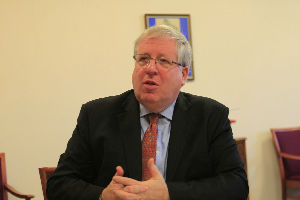Watchdog: Syria has filed chemical weapon details
Updated: 2013-10-27 22:39
(Agencies)
|
|||||||||||
THE HAGUE — Syria has filed details of its poison gas and nerve agent program and an initial plan to destroy it to the world's chemical weapons watchdog, the organization announced Sunday.
The Organization for the Prohibition of Chemical Weapons said in a statement that Syria completed its declaration as part of a strict and ambitious timeline that aims to eliminate the lethal stockpile by mid-2014.
The group, based in The Hague, said Syria made the declaration Thursday. The announcement provides "the basis on which plans are devised for a systematic, total and verified destruction of declared chemical weapons and production facilities," the group said.
Such declarations made to the organization are confidential. No details of Syria's program were released.
Syria already had given preliminary details to the OPCW when it said it was joining the organization in September. The move warded off possible U.S. military strikes in the aftermath of an Aug. 21 chemical weapon attack on a Damascus suburb. Syria denies responsibility for the deadly attack.
OPCW inspectors were hastily dispatched to Syria this month and have visited most of the 23 sites Damascus declared. They have also begun overseeing destruction work to ensure that machines used to mix chemicals and fill munitions with poisons are no longer functioning.
Syria is believed to possess around 1,000 metric tons of chemical weapons, including mustard gas and sarin.
It has not yet been decided how or where destruction of Syria's chemical weapons will happen. Syria's declaration includes a general plan for destruction that will be considered by the OPCW's 41-nation executive council on Nov. 15.
Norway's foreign minister announced Friday that the country had turned down a U.S. request to receive the bulk of Syria's chemical weapons for destruction because it doesn't have the capabilities to complete the task by the deadlines given.
The announcement came among renewed fighting in Syria. In the Christian town of Sadad north of Damascus, where al-Qaida-linked rebels and soldiers are fighting for control, a rocket smashed into a home and killed five members of a family, activists said.
At least three women were among the dead, said Rami Abdurrahman of the Britain-based Syrian Observatory of Human Rights. He said it wasn't clear whether the projectile was fired by Syrian soldiers or the hard-line rebels who have been trying to seize the town for the past week.
Abdurrahman said the rocket strike occurred overnight Friday. The Observatory obtains its information from a network of activists on the ground.
He says residents are trapped in their homes in the western neighborhoods of Sadad, which rebels have controlled since taking a checkpoint last week.
The rebels appear to have targeted Sadad because of its strategic location near the main highway north from Damascus rather than because it is inhabited primarily by Christians. But extremists among the rebels are hostile to Syria's Christians minority, which has largely backed President Bashar Assad during the conflict. Other al-Qaida-linked fighters have damaged and desecrated churches in areas they have overrun.
The official Syrian news agency said troops wrested back control of eastern parts of Sadad, but were clashing in other areas.
Also Sunday, Syrian Kurdish gunmen clashed with al-Qaida-linked groups to cement their control of a major border crossing with Iraq. The Kurdish militiamen captured the Yaaroubiyeh post in northeast Syria on Saturday after three days of clashes with several jihadist groups. Abdurrahman said the Kurdish gunmen were fighting pockets of rebels in southern Yaaroubiyeh.
Syria's chaotic three-year-old civil war pits Assad's forces against a disunited array of rebel groups. Al-Qaida-linked hard-liners have fought other groups as well as Kurdish militias who have taken advantage of the government's weakness to cement control over territory dominated by the ethnic minority.
In neighboring Lebanon, another two people were killed by sniper fire during fighting between rival sects in the northern city of Tripoli, the official state news agency reported.
At least nine people have been killed since clashes flared earlier this week, security officials said.
Syria's civil war has effectively spread to Lebanon's second largest city, where it has inflamed tensions between two impoverished Tripoli neighborhoods, home to Assad opponents and supporters.
The Bab Tabbaneh district is largely Sunni Muslim, like Syria's rebels. The other neighborhood Jabal Mohsen mostly has residents of Assad's Alawite sect, an offshoot of Shiite Islam.
The latest round of fighting began four days ago. Tensions had been mounting since Oct. 14, when a Lebanese military prosecutor pressed charges against seven men, at least one of whom was from Jabal Mohsen, for their involvement in twin bombings near two Sunni mosques in Tripoli on Aug. 23 that killed 47 people.
Lebanon shares its northern and eastern border with Syria. Lebanon's Sunni leadership has mostly supported the rebels, while Alawites and Shiites have backed the Assad government. Members of all three sects have gone as fighters to Syria.
Related Stories
Syria submits plan of destructing chemical weapons 2013-10-27 21:57
US helps UN destroy Syria's chemical weapons 2013-10-22 14:08
30 people killed in Syrian suicide blast 2013-10-21 11:06
Car bomb, clashes kill over 30 near Syrian capital 2013-10-20 02:04
Experts begin destroying Syria's chemical weapons 2013-10-07 01:28
UN: Destruction of Syrian chemical program begins 2013-10-06 20:01
Today's Top News
Carrier rocket sent to launch base for moon landing
Cold snap to sweep NE, N China
Paper apologizes for reporter's untrue stories
Giving the mentally ill a voice - on radio
China, Japan aiming for the win-win
Industrial profit growth accelerates
China supports upgrade of FTA
Drone training in line with intl law
Hot Topics
Lunar probe , China growth forecasts, Emission rules get tougher, China seen through 'colored lens', International board,
Editor's Picks

|

|

|

|

|

|





